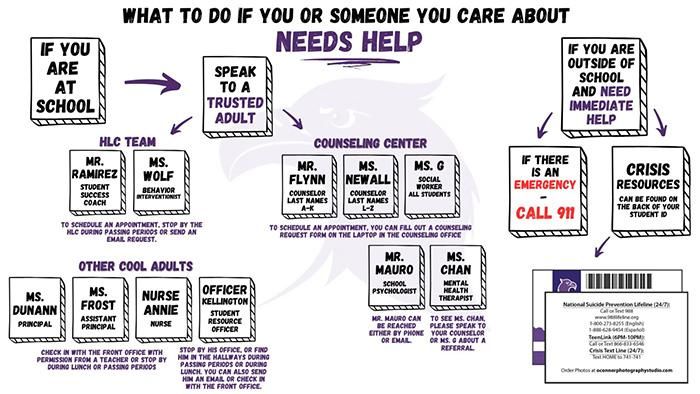By Richard Arlin Walker
Students in Anacortes School District will have less access to counseling help at school in the 2025-26 school year — three of eight counseling positions have been eliminated for budgetary reasons, leaving the district with five counselors for 2,600 students.
Students and parents said the cuts come at a bad time and asked the school board to keep those positions. Meanwhile, the district is losing its two top officials: Superintendent Justin Irish is leaving to become superintendent of Northshore School District in Seattle. Assistant Superintendent Becky Clifford is leaving to become superintendent of South Whidbey School District.
Kara Fox is one of the three counselors whose position was cut. Late in the school year, she told Salish Current of a typical week, when she:
- assessed a student’s suicide risk
- talked with law enforcement about a domestic violence report
- helped a transgender student plan for college
- assisted a student diagnosed with ADHD
- helped two students plan their studies so they could meet early graduation goals
- wrote individualized education plans for students moving up to ninth grade, and
- helped a former student return to school after having dropped out.
If a student needed help submitting a scholarship application, they saw Fox; ditto for applying for financial aid. Ten students were at risk of not graduating in June; Fox met with administrators and family members and set up a plan so those students would complete their graduation requirements.
“That is what I’ve done in three and a half days this week,” Fox said at the time. “The other high school counselors have the same kind of schedule.”
She added, “It’s going to be a skeleton staff next year, and it is not going to go well.”
The Anacortes School District website features a graphic that directs students where to go if they need counseling help.
The school board approved staff reductions for six certificated staff on March 20 and a number of classified staff on April 24, according to school board minutes and Nicole Tesch, assistant to the superintendent and school board. The school board approved the reductions in order to close a projected $1.5 million shortfall in the district’s $50 million budget.
Irish wrote in a letter to parents that the shortfall is the result of declining enrollment; rising costs of materials, supplies, insurance premiums and utilities; and insufficient funding from the state.
Funding and enrollment
Anacortes School District has seven schools. The district had 2,562 students and 412 staff members this school year.
Property owners in the school district support schools with a property tax of $1.70 per $1,000 of assessed valuation. The state contributes funds from the $2.25 per $1,000 of assessed valuation that it collects in local property taxes. A portion of school funding also comes from federal sources.
The district receives about $11,000 in state and federal funding for the education of each full time-equivalent student. Enrollment was down 22 students this year, School Board President Jennie Beltramini said — a revenue decline of $220,000. About $21.5 million — 43% of the budget — goes to wages, salaries and benefits.
The school district cut expenses and dipped into its fund balance for four consecutive years to balance its budget. The district cut $900,000 in expenses in 2022–23; $3.2 million in 2023-24; and $1.3 million in 2024–25. During those three school years, the district reduced administration by 20%, classified staff by 14% and teachers by 3%, according to district reports. Some $600,000 in reductions are forecast in 2026–27, 2027–28, and 2028–29.
‘The reduction in counselors comes during a
youth mental health crisis in the community and country.’
The district’s fund balance is projected to drop to 1.36% by the end of this school year, below the school board-required minimum of 4%.
Some parents and staff say the school district is playing financial sleight of hand.
The district eliminated the position of assistant superintendent but created the position of executive director of academic services and school support. “While there may be some overlap in responsibilities, the roles are not identical,” Tesch said. “The salary for the executive director of academic services and school support is slightly lower than that of the former assistant superintendent position.”
And management salaries climbed over the last four years. Irish’s salary increased from $214,041 in 2020–21 to $244,008 in 2023–24, the last year listed on a state database. Clifford’s salary rose from $188,325 in 2021–22 to $239,439 in 2023–24. Executive Director of Finance and Operations Michael Sullivan’s salary rose from $187,237 in 2021–22 to $231,767 in 2023–24.
“A friend of mine is a principal in a nearby school district that is in dire straits financially,” special education teacher Heather Shainan told the school board on May 22. “He tried to order $25 worth of pencils and that request was denied. But in that district, with a 0% fund balance, there is a counselor in every elementary school, so it seems clear to me that this comes down to our priorities — and what could possibly be a higher priority than our children’s lives?”
Meeting the crisis
Students and others at the April 24 school board meeting said the reduction in counselors comes during a youth mental health crisis in the community and country.
“When I first met Miss Fox I could tell that she was passionate about helping me,” said Paige Kirby, a senior at Anacortes High School. “Not only did she care about my academics, but she also cared about my activities outside of school, my relationships with my friends and parents, and she genuinely wanted to listen to what I had to say.
“My freshman year, I was really struggling with fitting in and she would put things into a different perspective. I’ve been mad in her office, I’ve been sad, I’ve been happy, but no matter what emotions I have been feeling she is always supportive. She mourns with students and celebrates with them. She answers all questions that I have and really works with me until we come to a solution.”
Renae Newall, one of two school counselors at Anacortes Middle School, read a portion of a letter written by the district’s counseling team. “In May 2023, the U.S. Surgeon General declared a youth mental health crisis. Anacortes is not immune from that reality. Every week, school district counselors are conducting suicide assessments, supporting students who have attempted suicide, implementing safety plans for students who self-harm and are suicidal.”
Ian Mayer, a counselor at Mount Erie Elementary School, also read from the letter, telling the school board that a reduction in counselors will mean “we will no longer be able to serve you with the level of quality responsiveness and care you deserve.” He predicted that “graduation rates will likely decline. We anticipate a rise in attendance issues, behavioral challenges and unmanaged mental health crises. Additionally, dropout rates may increase and students will be left without the college and career readiness guidance they need and deserve.
“Cutting school counselors is a safety concern. Under the proposed cuts, Fidalgo Elementary School will have one school counselor one day per week. Mount Erie will have one counselor one day a week, and Island View will have one counselor two days a week. We know our teachers, staff, families and students in our community will suffer greatly. Our most vulnerable students will feel these cuts. Students who come from difficult home lives, students of color, students with disabilities, English language learners, neurodivergent students, LGBTQ+ students and students living in poverty will feel this change first, but all students and staff will feel it every day.”
“The past two years, we’ve had to borrow money with interest from our own capital fund and from the county just to make payroll during some months,” Beltramini said. “The board’s goal is to modestly and gradually rebuild our reserves to avoid future borrowing and to put us into a stable budget situation for the next year.”
The only choice
Beltramini said other area school districts are cutting back as well. The Burlington-Edison School Board is closing an elementary school and converting another into a districtwide middle school, several news outlets have reported. Bellingham School District reported it is freezing pay for administrators, cutting 25 positions — several through attrition — and reducing the number of school days.
Beltramini, the school board president, said, “We’ve reduced classified staff where possible, including paraeducators, library assistants, custodians, maintenance and ground crews and we’ve reduced some certificated positions. There’s nothing left.”
Beltramini said she doesn’t want to reduce counseling staff, but that the district has no other choice.
She asked the labor unions to recognize the district’s financial situation and to give a little during contract negotiations.
“This isn’t a choice that we want to make. Social and emotional learning and student mental health are board priorities,” she said. “Throughout my time on the board, we’ve worked to expand mental health services for kids year after year, but our ultimate obligation as board members is to ensure the district’s financial solvency, and we’re left with very few options.
“We need all labor groups to acknowledge the difficult fiscal realities we’re facing and to come to the table with realistic expectations, solutions and ideas for cost savings. We also need the state to honor its obligation to amply fund public education, but until the state reforms school funding this will only get harder.”
Tesch said the school district is currently bargaining with six labor unions representing various employee groups in the district: Anacortes Education Association, Anacortes Paraeducator Education Organization, Anacortes Administrative Assistants Association, Anacortes Technology and Information Professionals, Service Employees International Union, Local 925 and Anacortes Principals Association.
“While each union follows its own bargaining timeline, active negotiations are underway,” Tesch said. “Our goal is to reach tentative agreements by early August and finalize ratification before the start of the 2025–26 school year to ensure a smooth start to the academic year.”
Republished with permission. Read the original article.

